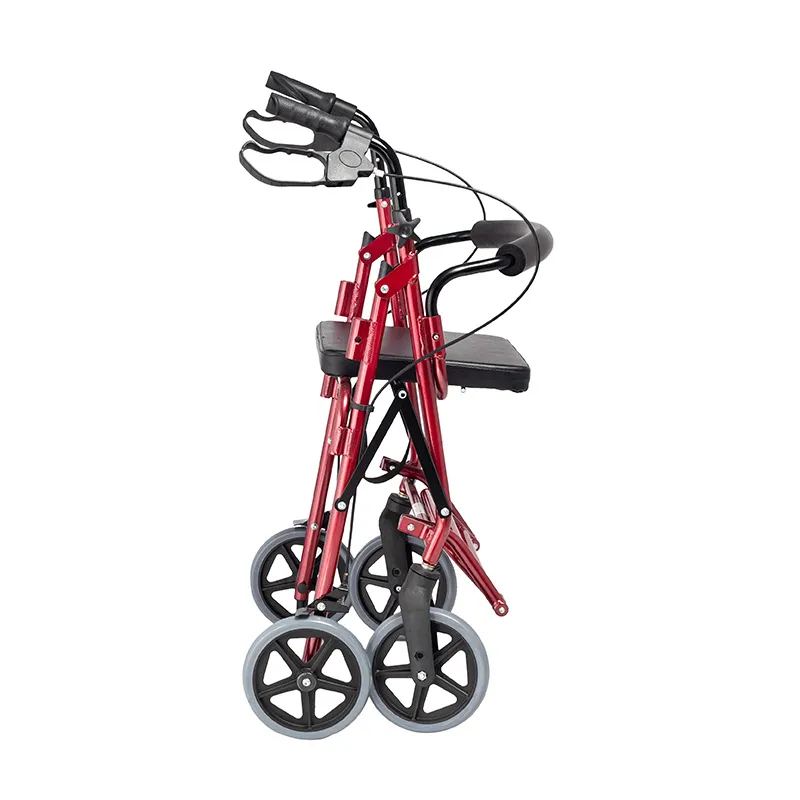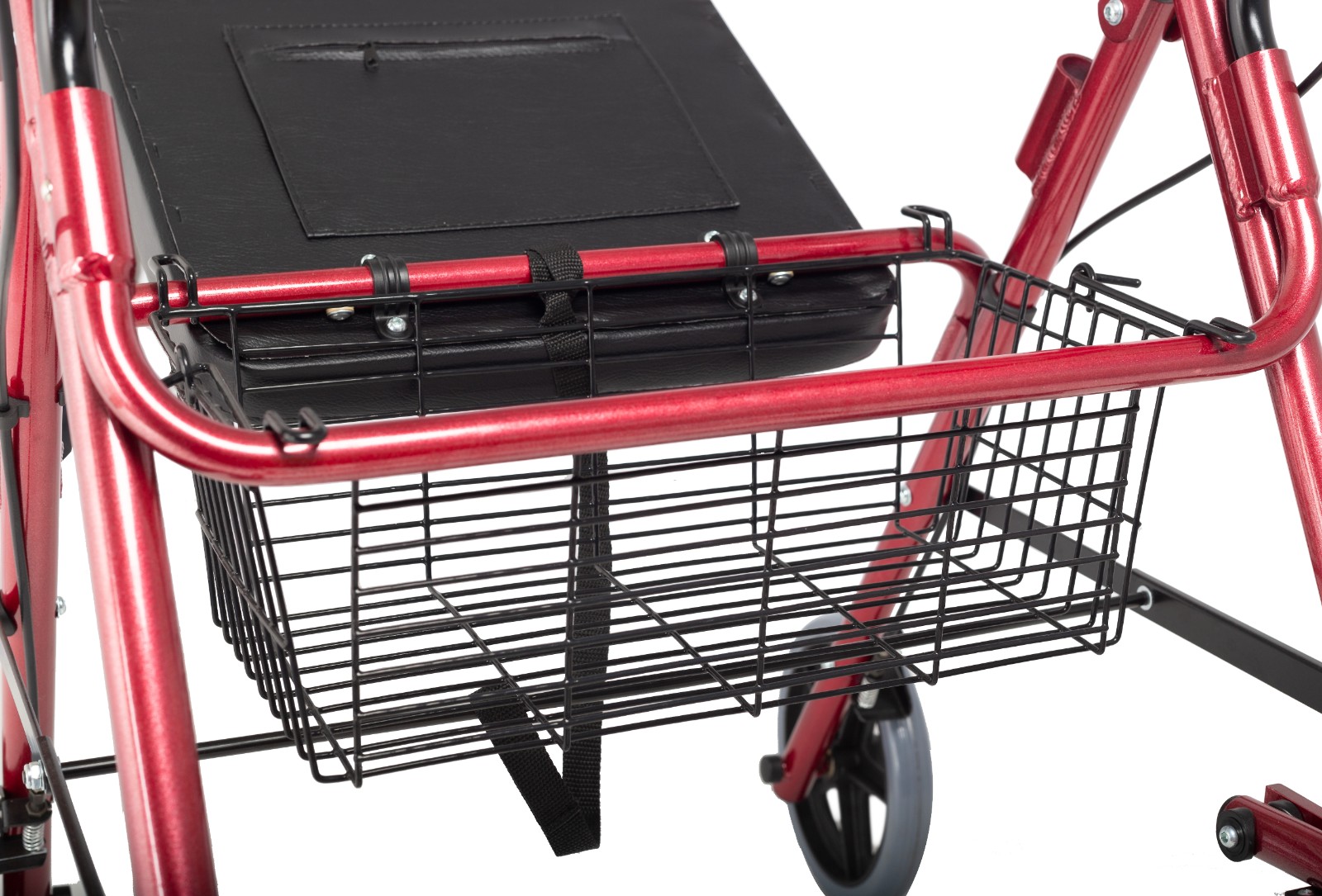
How Much Does a Lightweight Rollator Weigh?
2024-05-13 15:30
As the population ages and the demand for portable mobility aids increases, lightweight rollator walkers are attracting more and more attention due to their portability and flexibility. This rollator is lightweight, easy to carry and use, and is suitable for people of all activity levels. In this article, we will explore the weight of a lightweight rollator and its impact on users, and further explore how to choose the right lightweight rollator, as well as the considerations for using a lightweight rollator.
Weight of Lightweight Rollator
The lightweight rollator's weight is one of its greatest advantages. Typically, this rollator walker weighs between 11 pounds and 15.5 pounds. Depending on their weight and purpose, rollators can be divided into ultralight (usually weighing less than 11 pounds) and lightweight (weight ranges from 11 to 15.5 pounds):
1. Super lightweight rollator: usually weighs less than 11 pounds. This rollator walker is very portable and suitable for people who need to go out frequently or carry mobility aids with them.
2. lightweight rollator: Weight range is 11 lbs to 15.5 lbs. These rollators strike a balance between weight and stability, making them suitable for everyday use.
Whether it is an ultralight or lightweight rollator, its lighter weight provides great convenience to users. They are relatively easy to carry and move and can help increase the user's independence and mobility. However, the user's physical condition, daily activity level, and usage needs also need to be taken into consideration when choosing the right rollator.

How to choose the right lightweight rollator?
Choosing the right lightweight rollator walker requires considering many factors. For example: weight and portability, comfort and adjustability, safety performance, wheel type and size, features and accessories, budget and brand reputation. Only comprehensive consideration can ensure the safety and comfort of users.
Here are some key elements to pay attention to when choosing a lightweight rollator:
1. Weight and Portability: First, consider the weight and portability of your rollator. A lighter rollator is easier to carry and use, but also ensures stability and durability.
2. Comfort and adjustability: Rollators should have adjustable seat height and armrests to accommodate users of different heights and needs. Comfortable seats and armrests can enhance the user experience.
3. Safety performance: Choosing a rollator equipped with a braking system and stable structure can ensure the user's safety when walking and resting. You should also check whether its overall structure is solid.
4. Wheel type and size: The type and size of a rollator’s wheels have a great impact on its driving performance. Generally larger wheels are suitable for outdoor use, while smaller wheels are better suited for indoor use.
5. Features and Accessories: Some lightweight rollator walkers are equipped with additional features such as storage pockets, cup holders and armrest pads, which can enhance user convenience and comfort.
6. Budget and brand reputation: Choose an appropriate rollator walker based on your budget, and pay attention to the brand's reputation and user reviews to ensure you purchase products of reliable quality.
By comprehensively considering these factors, users can choose a suitable lightweight rollator to improve the quality of their daily lives.

What are the precautions for using lightweight rollator?
While the lightweight rollator provides convenience and support, it also requires users to: use it correctly, inspect it regularly, pay attention to road conditions, bear a reasonable load, turn and move carefully, and obey traffic rules. to ensure safety and comfort.
1. Proper Use: When using a rollator, make sure the seat and armrests are properly adjusted to fit the user's height and size. Maintaining correct posture can help reduce fatigue and discomfort.
2. Regular inspection: Regularly check the brake system, wheels and other parts of the rollator to ensure normal operation. Repair or replace problems promptly if problems are discovered.
3. Pay attention to road conditions: Pay attention to road conditions when walking and avoid walking on slippery or uneven roads to prevent slipping or falling.
4. Reasonable load-bearing: Try to avoid placing too many items on the rollator to prevent the rollator from losing balance or overloading, which will affect the use experience.
5. Turn and move with caution: Use caution when turning or moving to ensure safety. Avoid walking too fast or making sudden turns to prevent the rollator from losing control.
6. Obey traffic rules: When walking outdoors, abide by traffic rules and pedestrian ethics to ensure the safety of yourself and others.
By following these precautions, users can take full advantage of the lightweight rollator walker and increase independence and mobility in daily life.
Summary: Lightweight rollator walkers provide a portable, flexible and comfortable walking aid for many people, but there are several factors to consider when selecting and using one to ensure safety and comfort. In this article, we explore the weight of a lightweight rollator walker, what goes into choosing the right rollator, and what to consider when using it. By understanding this information, users can better choose and use lightweight rollators and improve the quality of daily life.








